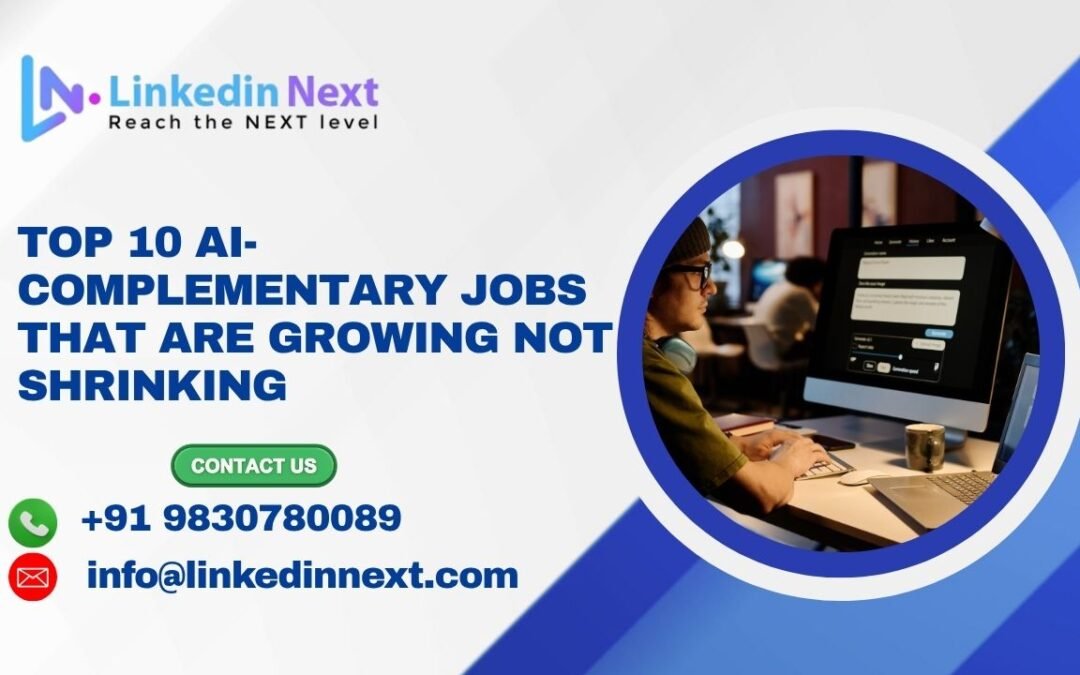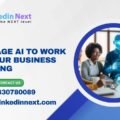Top 10 AI-Complementary Jobs That Are Growing Not Shrinking
Top 10 AI-Complementary Jobs That Are Growing Not Shrinking. As artificial intelligence reshapes the modern workforce, fear of job loss has become widespread. Yet, not all roles are at risk — many are actually thriving because of AI, not despite it. The new job market rewards human skills that amplify AI’s capabilities, blending technology with creativity, ethics, strategy, and empathy. In this era, the key to success is not to compete with AI, but to collaborate with it.
Below, we explore the top 10 AI-complementary jobs that are growing rapidly in 2025 and beyond — roles where humans and machines work together to create value.
1. AI Prompt Engineer
As generative AI tools like ChatGPT, Claude, and Gemini dominate workplaces, AI prompt engineers are becoming crucial. These professionals craft precise and creative prompts that guide AI systems to produce accurate, relevant, and high-quality outputs.
They combine linguistic intelligence, logic, and domain expertise to enhance AI performance. Industries like marketing, journalism, and product design now hire prompt engineers to optimize AI for efficiency and brand tone.
Key Skills: Language proficiency, creativity, logical structuring, AI model understanding.
Average Salary (2025): $100,000 – $150,000 annually.
2. Data Analyst and Data Visualization Specialist
AI thrives on data — and humans are needed to make sense of it. Data analysts and data visualization specialists interpret AI-generated insights, transforming raw numbers into actionable business intelligence.
While AI can identify trends, humans provide context, storytelling, and strategic judgment, ensuring that data-driven decisions align with company goals.
Key Skills: Data analytics tools (Power BI, Tableau), Python, SQL, critical thinking.
Growth Outlook: +23% by 2030 (U.S. Bureau of Labor Statistics).
3. AI Ethicist and Policy Expert
The rise of AI has sparked global concerns about bias, privacy, misinformation, and regulation. AI ethicists and policy experts help governments and corporations develop frameworks for responsible AI deployment.
Their role ensures technology aligns with human values and legal standards, balancing innovation with accountability.
Key Skills: Law, philosophy, AI governance, public policy, ethics.
Industries Hiring: Tech corporations, NGOs, research think tanks, and regulatory bodies.
4. Human-AI Interaction Designer (UX for AI)
As AI interfaces become more common in daily life — from chatbots to voice assistants — human-AI interaction designers are essential. They craft intuitive, empathetic, and user-centered designs that make AI tools accessible and enjoyable.
This role merges psychology, interface design, and machine learning understanding to improve user engagement with AI-driven systems.
Key Skills: UX/UI design, user psychology, natural language understanding, design thinking.
Career Outlook: High demand in SaaS, healthcare, and edtech sectors.
5. AI-Assisted Healthcare Specialist
AI is revolutionizing healthcare diagnostics, treatment planning, and patient monitoring — but it still requires human oversight. AI-assisted healthcare specialists combine medical expertise with AI tools to deliver faster and more accurate patient outcomes.
Radiologists, pathologists, and even general practitioners are now trained to use AI-driven imaging and diagnostic systems effectively.
Key Skills: Medical knowledge, AI diagnostics tools, data interpretation, empathy.
Impact: Reduced misdiagnosis rates, improved preventive care.
6. Cybersecurity Analyst and AI Threat Specialist
As AI systems become integral to business operations, they also become prime targets for cyberattacks. The result? A surge in demand for cybersecurity analysts with AI expertise.
These professionals use AI-based defense mechanisms to detect anomalies, predict attacks, and safeguard sensitive data. They also develop strategies to protect AI algorithms themselves from manipulation.
Key Skills: Network security, ethical hacking, machine learning, risk management.
Projected Growth: 35% increase by 2031.
7. AI Trainer and Machine Learning Operations (MLOps) Specialist
AI systems don’t learn on their own — they rely on AI trainers and MLOps specialists to fine-tune algorithms and improve model performance.
These experts curate and label datasets, evaluate AI behavior, and ensure models adapt to new information safely. MLOps roles, in particular, focus on integrating AI models into production systems efficiently and ethically.
Key Skills: Python, TensorFlow, data labeling, DevOps, cloud computing.
Industries Hiring: Finance, e-commerce, healthcare, and manufacturing.
8. Digital Marketing Strategist (AI-Enhanced)
AI is transforming how brands connect with audiences, but strategy remains human-driven. Digital marketing strategists now use AI for customer segmentation, predictive analytics, and automated campaigns, yet human creativity still defines storytelling, emotion, and authenticity.
These professionals interpret AI insights to craft personalized brand narratives and data-backed campaigns that convert.
Key Skills: SEO, content strategy, AI analytics tools, emotional intelligence.
Earning Potential: $80,000 – $130,000 annually.
9. AI-Driven Education Specialist
The education sector is embracing AI tutors, adaptive learning systems, and virtual classrooms. However, AI-driven education specialists play a key role in integrating these technologies while ensuring that learning remains human-centered.
They design AI-based learning programs, manage digital curriculum updates, and train educators in using intelligent tools effectively.
Key Skills: Educational technology, AI platforms, pedagogy, data analytics.
Career Outlook: Increasing global demand in online and higher education sectors.
10. Sustainability Analyst and AI Environmental Engineer
AI is becoming a vital tool in solving environmental challenges—from optimizing energy grids to predicting climate risks. Sustainability analysts and AI environmental engineers leverage data science and machine learning to develop eco-friendly solutions and sustainable business models.
They work in renewable energy, smart agriculture, and environmental research to minimize human impact on the planet.
Key Skills: Environmental science, AI modeling, IoT systems, data interpretation.
Growing Demand: Supported by ESG initiatives and climate policies worldwide.
The Human Edge in an AI World
What unites these growing professions is their fusion of human intuition and machine precision. The future of work is not man versus machine, but man with machine.
Jobs that combine creativity, emotional intelligence, ethics, and strategic reasoning will continue to flourish — because these are the very qualities AI cannot replicate.
To stay relevant, professionals must embrace AI as a collaborator, not a competitor. Learning how to leverage AI tools, interpret data, and think critically will define long-term success in every field.
Thank you for read our blog “Top 10 AI-Complementary Jobs That Are Growing Not Shrinking”.
Also read our more BLOG here.
I hope this blog is helpful to you, if you have any question feel free contact us at
Call/WhatsApp: +91.9830780089 || Email: info@linkedinnext.com







Recent Comments